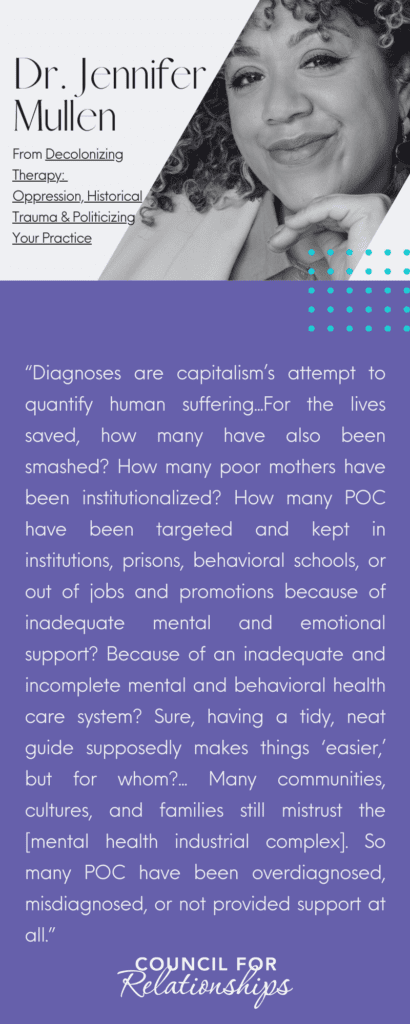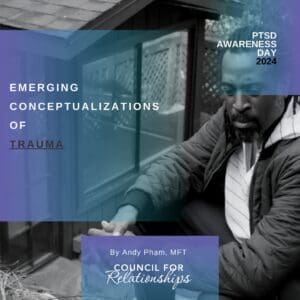PTSD Awareness & Emerging Ideas on Trauma
As we mark the 15th Annual PTSD Awareness Day, it’s essential to reflect on the evolving understanding of post-traumatic stress disorder (PTSD) and its impact on diverse communities. In this insightful blog, CFR Staff Therapist Andy Phạm, MFT, delves into the emerging ideas of trauma and the significance of precision in PTSD diagnosis.
With a focus on PTSD treatment and the broader scope of mental health awareness, Phạm explores how healing trauma requires a socioculturally attuned approach that considers the unique experiences of historically marginalized communities.
The Importance of Precision in PTSD Diagnosis
I learned the value of precision from a literature course I took by Professor Kevin Quashie, author of The Sovereignty of Quiet: Beyond Resistance in Black Culture. I wish I could eloquently paraphrase the beautiful, heart-wrenching ways that he uplifted precision and precise writing in our classes. Instead, what I can do is demonstrate how this event series, this semester-long course, has influenced my thinking.
PTSD Awareness and the Role of Precision
As I reflect on post-traumatic stress disorder for the 15th Annual PTSD Awareness Day, I find myself thinking about diagnosis through Professor Quashie’s lens of precision. The usefulness of diagnostic categories as a general genre comes from their ability to name a precise cluster of symptoms. Difficulty concentrating and trouble sleeping are symptoms that fall within the criteria of several DSM diagnoses.
Only when these difficulties are in relationship with other expressions, like heightened sensitivity to possible danger or intense self-protective avoidance strategies, may we begin to consider PTSD as a possible diagnosis. Diagnosing and quickly referencing a precise cluster of symptoms may be useful for conducting personal research, describing a lived experience, or connecting with online communities.
Historical Context of PTSD Diagnosis
PTSD became an official DSM diagnosis in 1980 following the inclusion advocacy of researchers who believed that dominant ideas of trauma were imprecise. Before the mental health field supported trauma studies, the prevailing question of mental health treatment was, “What is wrong with you?”
PTSD Awareness and Shifts in Diagnostic Approaches
Many populations of people, like Jewish survivors of the Holocaust and war veterans, found this capitalist question lacking and harmful. PTSD inclusion advocacy, trauma studies, and PTSD’s addition to the 3rd edition of the DSM all contributed to mainstream shifts away from “What is wrong with you?” and shifts toward “What happened to you?”
As a guiding, cognition-organizing question, “What happened to you?” created far more avenues for compassion towards and greater understanding of post-trauma suffering within mainstream society.
The Need for Precision in Modern Trauma Therapy
The established ideas of PTSD emerged as a response to the community’s need for more precision in understanding trauma and suffering. In 2024, 44 years after the first DSM inclusion of PTSD, there is, again, a community need for more precision in understanding trauma and suffering.

Learn more and purchase Dr. Mullen’s book here.
Modern PTSD Awareness and the Call for Precision
In her new book, Decolonizing Therapy: Oppression, Historical Trauma & Politicizing Your Practice, Dr. Jennifer Mullan highlights the politics of the DSM as a significant consideration of its strengths and shortcomings. Through her writing, Dr. Mullan provides compelling evidence for the ways that racism and other systems of oppression foster imprecise analyses of power within dominant culture’s discourses.
As Dr. Mullan and the realms of health equity, medical racism, medical apartheid, social determinants of health, healing justice, and science, technology, and society studies have all demonstrated, we must constantly reckon with the incredible impacts that systemic oppression has on our collective health, healing, and well-being. When we ignore this call, we miss all the precise ways that an unchecked, unchallenged devotion to the DSM might cause harm and further trauma.
Dr. Mullan describes this further in her book: “Sure, having a tidy, neat guide supposedly makes things ‘easier,’ but for whom?”
Balancing Speed and Precision in PTSD Awareness
A cognitive framework like the DSM and PTSD diagnosis naturally has limitations in its usefulness and applicability. Scholars of boundaries have highlighted how assertiveness, clarity, and flexibility are common hallmarks of secure boundaries. Ignoring a framework’s natural limitations may foster an inflexible, rigid way of thinking, creating an obstacle to precise understanding.
In many cases, we may be privileging speed over precise understanding. We may also be, imprecisely, presupposing that speediness and precision are mutually exclusive when there is often overlap. How often do we hear stories about misdiagnosis in systematically targeted communities, which causes prolongation of suffering? Even if speediness and precision are occasionally mutually exclusive, I wonder if we are certain that we want to be convenience-oriented in categorizing human beings.
Culturally Sensitive Approaches to PTSD
Dr. Samah Jabr, chair of the mental health unit at the Palestinian Ministry of Health, is one clinician who challenges the presumption that American institutions and diagnoses should hold global authority on mental health.
Specifically, Dr. Jabr highlights that mental health researchers and practitioners commonly utilize PTSD diagnostic criteria without intentionally assessing whether these criteria are clinically effective or socioculturally attuned for communities experiencing ongoing apartheid.
Global Perspectives on PTSD Awareness
In her 2019 article, Dr. Jabr additionally describes how PTSD is a Western concept that rests on the following two notions:
- A pre-traumatic baseline exists.
- Post-traumatic environments are easily available.
Zamzam Dini, a Marriage and Family Therapy doctoral candidate in the Minority Fellowship Program, also presented research findings on how PTSD failed to capture the experiences of refugee families precisely. Dini discovered the need for new, emerging trauma models to understand the impacts of migration trauma within refugee families over generations.
What is “post-traumatic” for communities of people subjected to established denialism of the systemic murders committed against them? What is a “pre-traumatic baseline” for people that fall outside the typical identities of participants researched to establish this baseline in the first place (white, cisgender, heterosexual, middle-class identities)?
Proposing New Questions for PTSD Awareness
This PTSD Awareness Day, I propose that we develop better, precise questions instead of chasing after convenient, speedy answers. I believe the innate dangers of the DSM and cultural imperialism become actualized threats as a result of the important, precise questions we forget, refuse, or fail to ask.
How have various communities had their ancestral trauma wisdom ignored, co-opted, commodified, or disregarded? Where might there be emerging liberation-oriented models for healing? What might the emerging futures of justice-oriented trauma frameworks need from us in this sociopolitical moment?

Andy Phạm, CFR Staff Therapist
Are You Struggling with PTSD? CFR Can Help
Are you struggling with PTSD, anxiety disorder, or other mental health issues? Let CFR’s over 85 individual, couples, and family therapy experts help you —–. See our Therapist & Psychiatrist Directory for CFR therapists or psychiatrists near you.
If this is an emergency, please call 911 or contact the National Suicide Prevention Lifeline by dialing 988.
More Mental Health Blogs for PTSD Awareness
CFR’s therapists, psychiatrists, and other mental health professionals offer much more to explore! Check out the CFR Expert Voices blog for great mental and emotional health advice on managing trauma recovery and PTSD symptoms, improving your relationships with family members, tips for healing from a traumatic experience, and much more. To get first access to our Expert Voices blog, join our mailing list!
Taking Care of Yourself or a Loved One After a Breast Cancer Diagnosis

